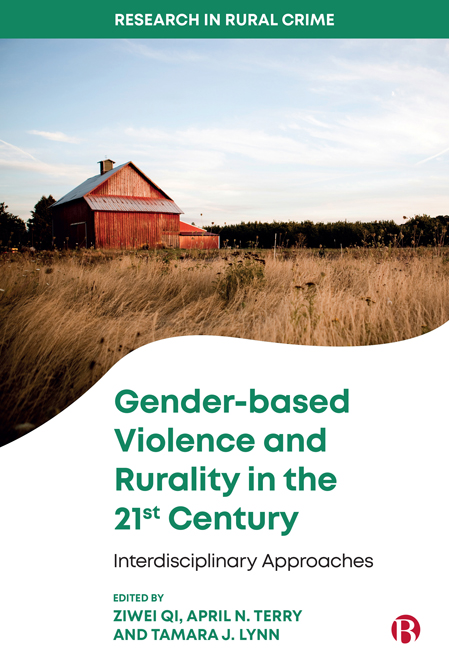Book contents
- Frontmatter
- Contents
- Series Preface
- List of Figures and Table
- List of Abbreviations
- Glossary
- Notes on Contributors
- Foreword
- 1 Understanding Rurality and Gender-based Violence
- PART I Rurality and Gender-based Violence
- PART II Beyond the Rural/Urban Divide: Critical Issues in Gender-based Violence
- PART III Access to Rural Justice: Economic Consequences and Policy Implications
- Index
7 - Comparing Characteristics of Rural and Urban Intimate Partner Violence Against Women
Published online by Cambridge University Press: 20 January 2024
- Frontmatter
- Contents
- Series Preface
- List of Figures and Table
- List of Abbreviations
- Glossary
- Notes on Contributors
- Foreword
- 1 Understanding Rurality and Gender-based Violence
- PART I Rurality and Gender-based Violence
- PART II Beyond the Rural/Urban Divide: Critical Issues in Gender-based Violence
- PART III Access to Rural Justice: Economic Consequences and Policy Implications
- Index
Summary
Introduction
Intimate partner violence (IPV) is a critical problem in the United States. Resource availability and cultural differences often exacerbate this problem for victims in rural communities. Despite this, very little research has focused exclusively on understanding the characteristics of IPV in rural communities; much scholarly research on this topic focuses on IPV occurring in urban environments. Some argue that the dearth of studies on rural IPV can be explained, in part, by social scientists, specifically criminologists, considering rural crime less important or serious than urban crime (Weisheit and Donnermeyer, 2000). At the same time, nearly all studies of IPV indicate violence against women occurs across all geographical locations, socioeconomic statuses and demographics (Breiding et al, 2015). Some research suggests women in rural areas experience higher rates of IPV and greater frequency of severe physical abuse than do their urban counterparts (Peek-Asa et al, 2011). Many of these differences can be explained by lack of access to resources, unwillingness of local law enforcement to intervene, and cultural and social norms in rural communities (Breiding et al, 2015). Even though a few studies have observed differences in IPV prevalence, frequency and severity by rurality, important gaps in knowledge exist regarding differences and similarities between rural and urban IPV (Lanier and Maume, 2009; Peek-Asa et al, 2011). To better understand these gaps, this chapter examines differences in incident characteristics of IPV against women in rural and urban locales.
This chapter uses incident-level crime victimisation data from the National Incident-Based Reporting System (NIBRS) and county-level data from the US Census Bureau's 2018 American Community Survey. Although not yet nationally representative due to lack of formal reporting requirements by law enforcement agencies, NIBRS is an ideal dataset to use because of its breakdown of crime incident data into distinct subcategories, which allows greater reporting specificity, and its more nuanced offence definitions compared to the previously used Summary Reporting System (SRS) (NIBRS, 2016). NIBRS helps law enforcement and researchers efficiently develop a clearer picture and deeper understanding of the patterns and characteristics of violence against women. NIBRS is especially useful for researchers interested in studying rural domestic violence as law enforcement agencies can be linked to Census population demographic information.
- Type
- Chapter
- Information
- Gender-based Violence and Rurality in the Twenty-first CenturyInterdisciplinary Approaches, pp. 93 - 106Publisher: Bristol University PressPrint publication year: 2023



